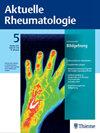系统性硬化症患者循环维生素D水平:荟萃分析
IF 0.2
4区 医学
Q4 RHEUMATOLOGY
引用次数: 0
摘要
【摘要】目的研究循环维生素D水平与系统性硬化症的关系,探讨维生素D缺乏与系统性硬化症的关系。方法我们进行了荟萃分析,比较了系统性硬化症患者和健康对照者的血浆/血清维生素D水平和维生素D缺乏症,并检查了循环维生素D水平与罗德曼评分之间的相关系数。结果纳入21项研究,1399例系统性硬化症患者和1311例对照。系统性硬化症组的维生素D水平明显低于对照组。种族分层显示,在欧洲、亚洲、阿拉伯、拉丁美洲和混合人群中,系统性硬化症患者的维生素D水平显著降低。年龄、性别和/或体重指数分层显示,无论调整如何,系统性硬化症组的维生素D水平明显较低。按样本量进行的亚组分析显示,小样本数(n<100)和大样本数(n>100),系统性硬化症组的维生素D水平显著降低。按发表年份分层显示,系统性硬化症组的维生素D水平在最近和旧的发表年份都明显较低。然而,在弥漫性硬化症和局限性硬化症之间,维生素D水平没有显著差异。维生素D缺乏与系统性硬化症显著相关。相关系数的荟萃分析显示,循环维生素D水平与罗德曼评分呈负相关趋势。结论系统性硬化症患者循环维生素D水平较低,维生素D缺乏程度较高,循环维生素D水平与罗德曼评分呈负相关。本文章由计算机程序翻译,如有差异,请以英文原文为准。
Circulating Vitamin D Levels in Patients With Systemic Sclerosis: a Meta-Analysis
Abstract Objective This study aimed to evaluate the relationship between circulating vitamin D levels and systemic sclerosis and to establish an association between vitamin D deficiency and systemic sclerosis. Methods We performed a meta-analysis comparing the plasma/serum vitamin D levels and vitamin D deficiency between patients with systemic sclerosis and healthy controls and examined correlation coefficients between circulating vitamin D levels and the Rodnan score. Results Twenty-one studies involving 1,399 patients with systemic sclerosis and 1,311 controls were included. The systemic sclerosis group had significantly lower vitamin D levels than the control group. Stratification by ethnicity demonstrated significantly decreased vitamin D levels in patients with systemic sclerosis among European, Asian, Arab, Latin American, and mixed populations. Stratification by age, sex, and/or body mass index revealed significantly lower vitamin D levels in the systemic sclerosis group regardless of the adjustment. Subgroup analysis by sample size revealed significantly lower vitamin D levels in the systemic sclerosis group by small (n<100) and large sample numbers (n>100). Stratification by publication year revealed significantly lower vitamin D levels in the systemic sclerosis group in both recent and old publication years. However, no significant difference in vitamin D levels was observed between diffuse and limited types of systemic sclerosis. Vitamin D deficiency was significantly associated with systemic sclerosis. The meta-analysis of correlation coefficients revealed a tendency of inverse correlation between circulating vitamin D levels and the Rodnan score. Conclusions Patients with systemic sclerosis had lower circulating vitamin D levels and higher vitamin D deficiency and there was a tendency of inverse correlation between circulating vitamin D levels and the Rodnan score.
求助全文
通过发布文献求助,成功后即可免费获取论文全文。
去求助
来源期刊

Aktuelle Rheumatologie
医学-风湿病学
CiteScore
0.30
自引率
0.00%
发文量
135
审稿时长
>12 weeks
期刊介绍:
Immer auf dem Laufenden: - Kontinuierliche Fort- und Weiterbildung - Themenhefte mit Übersichtsarbeiten - Originalarbeiten zum Stand der Forschung - Informationen über neueste Entwicklungen Für Sie notiert - Nachrichten aus dem Fachgebiet - Aktuelle Literatur kurz referiert Das ganze Spektrum rheumatischer Erkrankungen aus internistischer und orthopädischer Sicht: - Interdisziplinär - Kompetent - Praxisnah
 求助内容:
求助内容: 应助结果提醒方式:
应助结果提醒方式:


